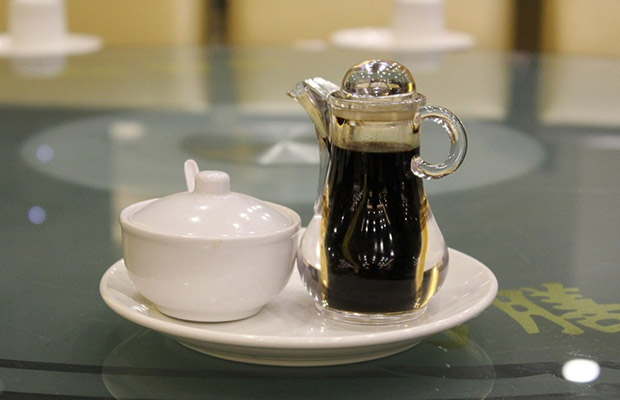Does soy sauce need to be refrigerated? When someone asks this question, suddenly you’re not so sure, and it’s not only because your refrigerator is overflowing. You’re in luck, but let us explain details first.
Table of Contents
Does Soy Sauce Need to Be Refrigerated?
The quick response? No, most of the time soy sauce doesn’t require refrigeration.
The fact that fermented foods like fish sauce and miso may technically be kept out at room temperature for a while without going bad is one of its coolest qualities. The meal’s resident microbes do more than only add flavor; they also aid in food preservation.
A mixture of fermented soybeans, toasted grains, brine (also known as saltwater), and a mold called kji are used to make soy sauce. The salty brown liquid actually brews for a long time at room temperature during the months-long process. No, it doesn’t need to be placed in the refrigerator. If you think about the packets you get with Chinese takeout—they’re not typically cold—they won’t go bad at room temperature. With a few restrictions, it won’t deteriorate but its flavor may diminish.
Soy sauce can be stored outside of the refrigerator for up to one year after opening and can remain unopened for up to two or three years (practically forever). However, if a bottle lasts longer in your home, you should probably create room among your other condiments in the refrigerator to maintain the savory, delicious flavor of that soy sauce.
How to Store Soy Sauce At Room Temperature?
Soy sauce needs to be kept out of heat and sunshine, just like coffee beans and olive oil. Instead of nestling next to your stovetop or on the window sill, where light and heat will quickly deteriorate its quality, choose a cold, dark cupboard. And if you accidentally purchased a gallon jug of the substance, we advise decanting the remainder into a smaller bottle and storing it in the refrigerator (you know, if it will fit in there).
The following guidelines describe how long soy sauce lasts after opening both with and without refrigeration:
- The most typical kind lasts two years when refrigerated and one year when not.
- All other types: When refrigerated, they last a year and shouldn’t be left out after being opened.
How to Judge Whether Soy Sauce Has Gone Bad?
Although the Kikkoman website claims that “The soy sauce would not perish if it had not been refrigerated as long as no water or other ingredients have been added,” it also adds that “Once opened, the soy sauce will start to lose its freshness and the flavor will start to change.” The sauce will taste and be of higher quality for a longer time if it is refrigerated. Therefore, we can infer from this statement that if we do not keep our bottle of soy sauce chilled, the following might occur over time.
- The soy sauce will start to smell more strongly of alcohol.
- The soy sauce’s flavor will start to alter and sharpen.
- The product will start to lose some of its original quality and look.
What causes particular varieties to spoil more quickly, what causes them to last longer, etc.
In terms of keeping its freshness, flavor, and overall look, normal soy sauce is the most dependable. Other varieties of soy sauce lack the crucial combination of soybeans, wheat, salt, and water, along with the fermentation process that makes the “normal” variety shelf-stable even after being opened for a protracted period of time.
Other varieties of soy sauce are less dependable and may lose their freshness more quickly due to the addition of or deletion of those four essential ingredients as well as a variation in the fermentation process. All other forms of soy sauce should be stored in the refrigerator after opening to maintain their freshness longer.
Things That Help Soy Sauce Last Longer
Here are some sensible guidelines that will help your soy sauce stay fresher for longer:
- The unopened bottle should be kept in a cool, dry location that is away from any light or heat sources, like a pantry or cabinet.
- If you won’t be using the entire bottle within a year, store it in the refrigerator after opening.
- Once chilled, keep it chilled at all times.
- Keep the bottle covered if you decide not to refrigerate it after opening to prevent airborne infection.
Types of Soy Sauce That Shouldn’t Be Kept At Room Temperature
- Soy sauce with low sodium has up to 40% less sodium than conventional soy sauce.
- In addition to having caramel and/or molasses added, dark soy sauce has a longer fermentation process than light soy sauce.
- Dark soy sauce with dried straw mushrooms or dried Chinese black mushrooms added to it is called soy sauce with a mushroom taste.
- Soy paste, or soy jam, is a thick soy sauce that is thicker and sweeter than conventional soy sauce.
- Saltwater from dried prawns is added to soy sauce to give it a shrimp flavor.
- Using fermented soybeans, a variety of sugars, and spices such palm sugar, star anise, and garlic, Indonesian Kecap Mantis is a thick and extremely sweet soy sauce.
- Chinese Tamari, which is thicker than standard soy sauce and is a by-product of the miso-making process. This kind of soy sauce can be used in a gluten-free diet because it contains little to no wheat and can be regarded as gluten-free.
What About Other Condiments That Need to Take Out of Fridge?
Of course, yes. Another fermented condiment, hot sauce, can be kept in the pantry (and that includes sriracha). The same is true for honey, which will crystallize in colder climates. Olive oil and peanut butter can both hang at room temperature just fine, however they will both last longer in the refrigerator. Which is that? You must arrange your refrigerator, right away.

